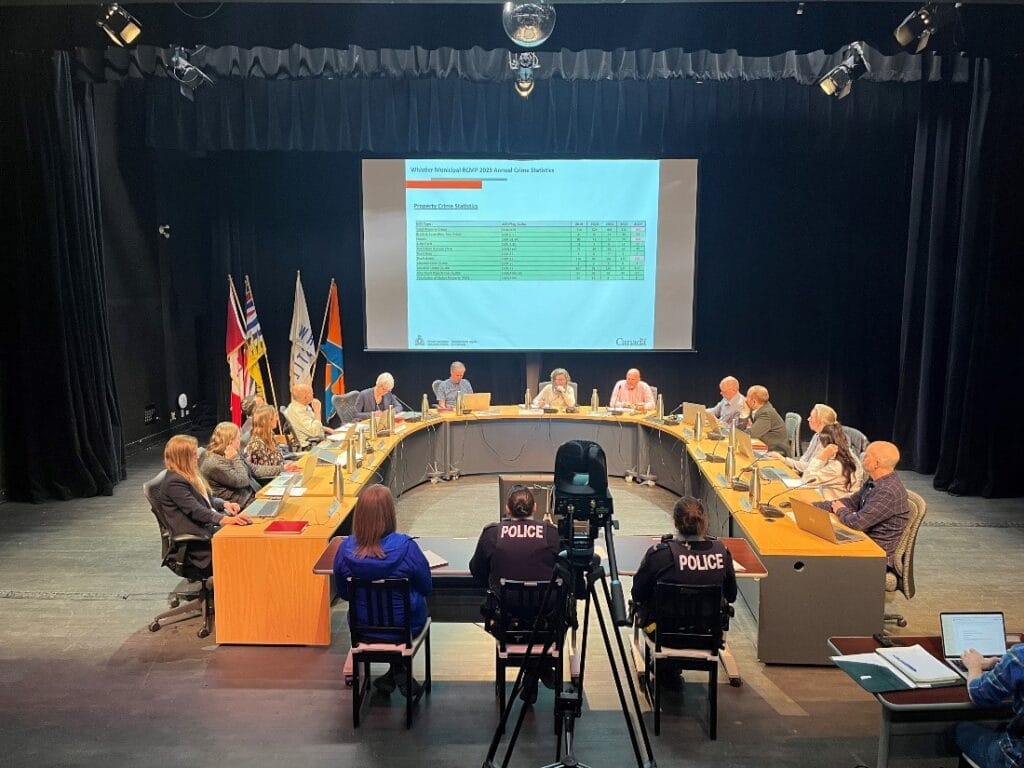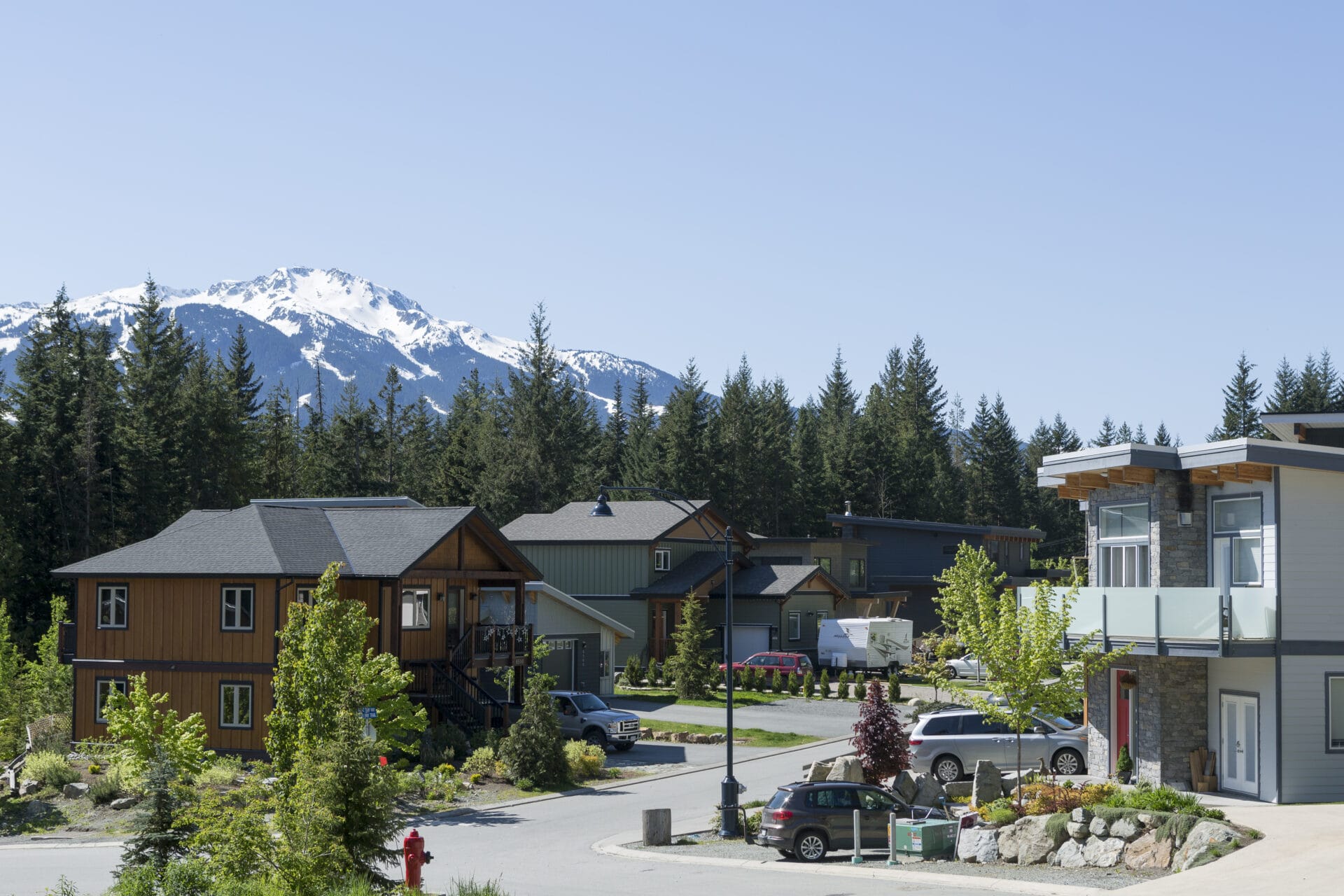New water conversation restrictions in place starting May 1, Vulnerable populations assessment highlights complexity of housing needs, and more.
Looking to get caught up on the Tuesday, March 19 Council Meetings? We’ve pulled together some key stories from Committee of the Whole and the Regular Council Meeting, including:
- Water restrictions changed to improve conservation;
- RCMP share the 2023 community policing statistics;
- Staff present the Vulnerable Populations Housing Needs Assessment, looking at the supply and demand of rental housing for those experiencing barriers; and
- Council support for Valley Trail section connecting Function Junction to Alpha Lake and beyond.
For all the details, check out the recording of the full meeting on whistler.ca.
New water conservation restrictions in place to adapt to climate change and mitigate wildfire risk

Coun. De Jong noted the “inevitable catastrophic fire” in his comments in support of changing the water restrictions bylaw.
A tighter water restriction system will be in place beginning in May.
Under the new bylaw, Stage 2 Water Restrictions will limit automatic in-ground irrigation systems to six hours, three times per week, and divide residents into Monday-Wednesday-Friday or Tuesday-Thursday-Saturday watering schedules based on neighbourhood.
“Adoption of the amendment will allow Whistler to conserve the existing water supply,” said the RMOW’s Manager of Utilities, Chris Wike, “to continue to provide a reliable domestic water supply, and the required firefighting water storage while pursuing other water conservation measures…”
Pressure on water infrastructure is increasing as low snowpack, drought conditions and more wildfires raise demand for water and reduce reservoir recovery time.
The Outdoor Potable Water Usage Amendment Bylaw focuses water conservation to three stages:
- Stage 1: Minimal restrictions fall to spring
- Stage 2: Summer season irrigation schedule, with time-of-day and day-of-week restrictions
- Stage 3: Severe irrigation and outdoor water use restrictions
This is meant to preserve drinking water supply and keep reservoirs above minimum fire protection levels, while maintaining reasonable opportunities to water lawns, gardens and landscapes.
Check whistler.ca before May to find your watering schedule. Read the full report on whistler.ca and listen to the council debate.
RCMP give community snapshot with annual crime stats

Driving too fast for the conditions is a far greater problem on the highway than unsuitable tires, according to Whistler RCMP.
Staff Sergeant Sascha Banks says she’s personally conducted tire checks this year and estimates three of 2,000 stops will have cars with unsuitable, non-winter tire tread.
“You can have the biggest, chunkiest winter backcountry tires on your vehicle, but if you drive too fast for conditions, you’re going to cause issues,” she said.
The issues of the past month are multifaceted, she acknowledged, as they involved buses and larger trucks, which were not equipped to deal with conditions. There is a regular meeting of the Sea to Sky community partners involved with the highway and they will be addressing the issue.
Other key data shows property crime is up; alcohol-fuelled assaults are nearing 2019 levels; collisions have decreased; and Whistler’s officers are handing out more tickets as they work to crack down on speeding.
The RCMP Year-End and Strategic Plan Update revealed:
- Overall mental health calls are down, but the cases more severe (140 cases)
- Total calls for violent crime (304 cases) is the highest it’s been in five years, partially driven by a slight increase in the number of assaults
- Overall property crime remains below pre-pandemic levels with 101 fewer cases, though bike theft is on the rise (43 cases)
- Theft of ski jackets and pants is common, but the incidents of small property crime under $5000 are still lower than pre-COVID times with 20 less cases (156 vs. 176)
- There were less traffic collisions this year, in fact the lowest in five years (129 vs 198 2019)
Tickets
- 1601 total tickets issued by RCMP, their highest in five years (2019 at 1175) *due to more stops and focus on speeding
Items to note:
- Bikes are stolen off racks and from garages
- The high number of violent crimes “…really has to do with the reopening of Whistler” and the cases are often alcohol-related
To view the presentation, watch the recording at whistler.ca.
“Housing options for vulnerable populations are needed now” (RMOW Staff Report)

Advocates say Whistler needs to increase housing options for vulnerable people.
There is a lack of housing for the most vulnerable members of our community—and the need is rising, according to the Vulnerable Populations Housing Needs Assessment.
Vulnerable populations include those facing a job loss, eviction, violence, divorce or health problems, which make securing housing more difficult.
“This town has done incredible work on housing… [but] there is lots more for all of us to do together,” said Mayor Jack Crompton, stressing the non-profit sector, municipality and its subsidiary corporations—Whistler Housing Authority and Whistler Development Corp. —must focus on collaboration.
Including collaboration, the report broke down the next steps for the municipality into five actions. These include continuing to engage with the public through collecting and sharing data, keeping the report findings top of mind when developing housing plans, finding ways to encourage the development of new housing, and carefully regulating land use.
The Assessment paints a picture of vulnerability through true anonymous accounts of:
- A woman who fled domestic abuse only to have to move eight times in nine months with her children;
- A recent immigrant whose school commitments limited his work hours, leaving him ineligible for his best shot at securing housing, a Whistler Housing Authority space, though his wife was about to join him;
- And a divorced father who lived in his van before securing a WHA rental, which he can barely afford with two teenage sons.
The housing landscape is then divided into four categories with present and future needs established. This breaks down as:
Emergency Housing: Immediate, short-stay housing for people who are homeless or at risk of becoming homeless.
- Preset need is six year-round beds, growing to eight beds over the next decade
Transitional Housing: Aims to transition people to long-term, permanent housing. These typically support people who are in crisis and need an intermediate step between shelter and permanent housing and are sometimes targeted to specific groups, such as women and children fleeing or at risk of violence. Transitional housing types include: transition houses, safe homes and second stage housing.
- There is currently one second-stage housing unit in Whistler for people experiencing or at risk of violence. There are no transition houses or safe-home options. Additionally, there is no transitional housing option for people who require immediate and temporary accommodation.
- One transition house for women and children is needed now, with an additional second-stage housing unit needed in the next 10 years.
Supportive Housing: Housing that provides on-site supports and services to residents who cannot live independently, including older adults, people with disabilities, and youth aging out of foster care.
- No supportive housing options for adults, older adults or people with disabilities exist, though one option is available for youth, aged 19-24: the nine-bed Zero Ceiling program
- It’s anticipated 28 youth supportive housing beds are needed 10 years for now, along with an estimated 26 beds for the other demographics.
Non-market rental: This is geared to low- to moderate- income individuals and families who experience barriers to finding and maintaining affordable and suitable housing in the private market.
- Despite the variety of non-market housing rentals, 114 very-low income households require shelter costs below $495, 548 low-income households require shelter costs below $1,237 and 512 moderate income household required shelter costs below under $1980.
- It is anticipated for 2033 that 145 very low-income households, 693 low-income households, 647 moderate-income households will require affordable housing (see full report).
The Needs Assessment found foodbank and outreach services use continues to rise and there is less stigma in using the services.
Overall, vulnerability is increasing, particularly among women and children, older adults, people with disabilities, youth, indigenous households, and recent immigrants.
The Assessment will be used to inform the Long-term Housing Strategy, which will look at what housing is required to meet the needs of the community over a 20-year planning horizon. This report is available on whistler.ca, and funded by a Vancouver Coastal Health grant.
Valley Trail “expressway” from Creekside to Function Junction to boost Whistler’s active transportation goals

The Valley Trail currently features over 50 km of multi-use trail available for walking, running, cycling, skating or rollerblading. Photo: Justa Jeskova
A critical one-kilometer gap in Whistler’s Valley Trail may be filled in the next few years.
Council unanimously supported staff in taking the next steps to facilitate a Valley Trail extension on the north side of Alpha Lake, connecting the Alpha Lake Park and Millar Creek sections.
Currently, those heading to Function Junction must cross Highway 99 at Bayshores and wind through the neighbourhood to Creekside in order to continue south. Coming up from Function, there is a similar disconnect as one follows the Millar Creek section, which ends at Tamarisk, leaving users to find their way.
Four potential routes were identified and assessed in 2022 before narrowing in on this proposal. Permits and tenures are now underway, and will be followed by community engagement, with an eye to project completion by 2027 or 2028.
To attend an upcoming meeting, check out the Council Meeting Schedule. Agendas and Minutes are available online. To connect with Council, consider Presenting to Council, or get in touch with them individually by phone or email.

